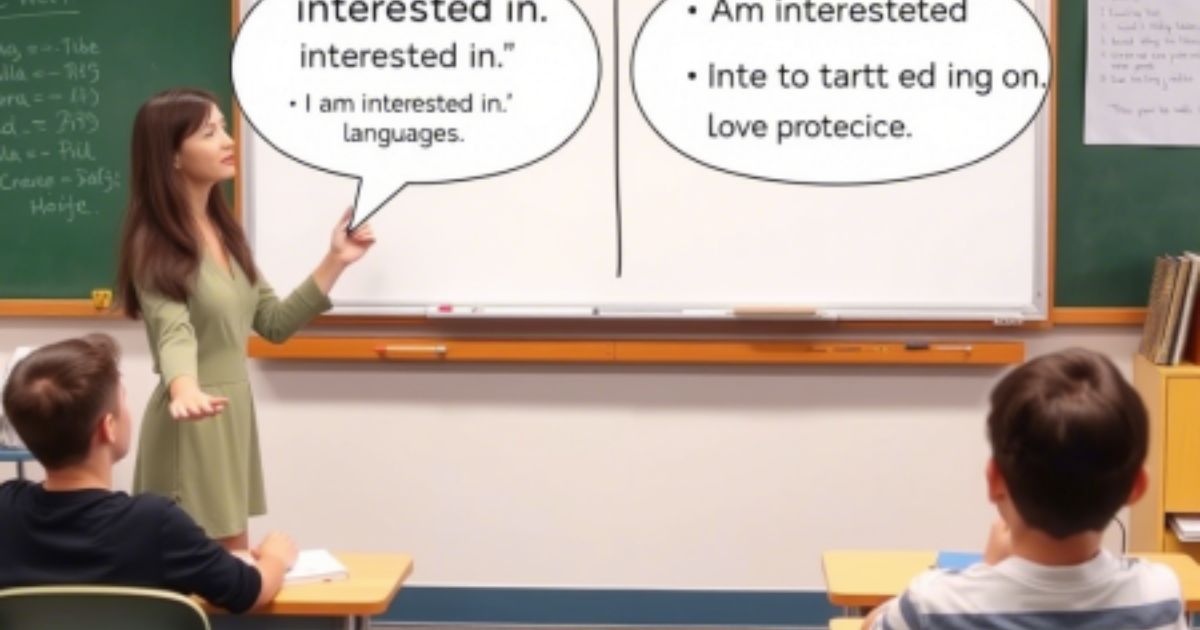Understanding whether to use “Interested In or On” can be confusing, especially for non-native English speakers. The correct phrase is “interested in,” as it helps express curiosity or attraction toward a subject. Many people mistakenly say “interested on” instead of “interested in,” leading to grammar errors. Learning when to be interested in or on something is essential for clear communication.
If you ever wonder whether it’s “interesting in or on” or which phrase to use, remember that the right choice is “interested in.” For example, we say, “I am interested in music,” not “I am interested on music.” Knowing how to be interested in or on different topics correctly helps improve English fluency. Avoiding mistakes like “interested on or in” makes your speech and writing sound more natural and professional.
Which one is right – Interested In or On? What’s the main answer?
Choosing the right preposition can be tricky, especially when deciding between interested in or interested on. The correct phrase is interested in because it properly expresses curiosity, passion, or enthusiasm about something. For example, “I am interested in learning new languages” is correct. If you are wondering whether to use interested on or in, always go with interested in for proper grammar.
Many English learners get confused about whether to say to be interested in or on. However, only interested in is correct in standard English. Saying interested on sounds unnatural. If you’re unsure, just remember that be interested in or on should always be interested in. This is the proper way to structure a sentence.
When choosing between interesting in or on, keep in mind that interested in is widely accepted in both casual and formal communication. Whether you’re talking about a hobby, subject, or career, interested in is always the correct choice. Understanding this rule will help you improve your English fluency.
If you are ever unsure about which one to use, simply think about how native speakers talk. No one says, “I am interested on movies,” but “I am interested in movies” sounds natural and correct. When in doubt, stick with interested in, and you’ll never go wrong.
1. “Interested In”
The phrase interested in is used when talking about passions, hobbies, studies, or anything that sparks curiosity. It correctly conveys what someone finds exciting or engaging. For example, “She is interested in photography” or “He is interested in technology.” If you’re trying to decide between interested on or in, always choose interested in for accuracy.
One way to remember this rule is by practicing common phrases like “I am interested in music” or “They are interested in traveling.” These sentences sound natural and grammatically correct. If you are still confused about to be interested in or on, just remember that interested in is the correct form.
Even in professional settings, interested in is the right choice. A company might say, “We are interested in expanding our business overseas.” Using interested on here would sound unnatural. If you ever doubt whether to say interesting in or on, remember that in is always correct.
If you are writing or speaking in English, make sure to use interested in when discussing something you like. For instance, “She is interested in learning new skills” sounds fluent, whereas “She is interested on learning new skills” is incorrect. To improve your English, practice using interested in in different sentences.
2. “Interested On”
The phrase interested on is not commonly used in English and is considered incorrect in most situations. Many non-native speakers mistakenly use interested on instead of interested in, leading to awkward-sounding sentences. For example, “I am interested on history” is incorrect, while “I am interested in history” is correct. If you’re unsure about be interested in or on, always choose interested in.
One reason people make this mistake is that on is often used in other contexts, such as “on the table” or “on the news.” However, on does not work with the word interested. If you are deciding between interested in or on, the right answer is always in.
To avoid confusion, never use interested on when talking about hobbies or interests. For example, saying “He is interested on playing soccer” is incorrect. The correct sentence would be “He is interested in playing soccer.” Understanding this simple rule will improve your grammar.
If you are ever confused about whether to say interesting in or on, remember that interested in is the correct choice. Whether discussing work, studies, or personal hobbies, interested in is the right phrase to use in any situation.
60 points about the correct usage and context of “interested in” and “interested on”
- The phrase interested in is grammatically correct in English.
- Interested on is incorrect and should not be used.
- Use interested in when expressing curiosity or enthusiasm about something.
- Example: “I am interested in photography.”
- Interested on does not sound natural in English.
- When deciding between interested in or on, always choose interested in.
- Example: “He is interested in learning Spanish.”
- Interested in is used for hobbies and passions.
- Example: “She is interested in music.”
- If you’re wondering to be interested in or on, the answer is always in.
- Interested in is correct when talking about studies or research.
- Example: “The scientist is interested in climate change.”
- Interested in is used when discussing people’s preferences.
- Example: “They are interested in outdoor activities.”
- Never say interested on when referring to an activity or topic.
- Example: “She is interested on cooking” is incorrect.
- Instead, say: “She is interested in cooking.”
- The phrase interested in is common in both spoken and written English.
- If you are talking about a subject, always use interested in.
- Example: “I am interested in psychology.”
- Companies use interested in when discussing business opportunities.
- Example: “Our company is interested in expanding globally.”
- Using interested on in professional settings sounds ungrammatical.
- Example: “We are interested on your proposal” is incorrect.
- The correct version: “We are interested in your proposal.”
- Interested in can also refer to relationships and people.
- Example: “She is interested in meeting new friends.”
- When in doubt, choose interested in to sound natural.
- If you’re unsure whether to say be interested in or on, choose in.
- Interested in applies to job applications.
- Example: “I am interested in applying for the position.”
- Interested on should never be used in formal writing.
- Always remember: interested in expresses a feeling or preference.
- Example: “He is interested in technology.”
- Interested in works when discussing books, movies, or TV shows.
- Example: “I am interested in action films.”
- Never say interested on watching action films.
- Instead, say: “I am interested in watching action films.”
- Interested in is commonly used in academic discussions.
- Example: “She is interested in historical research.”
- If you’re still unsure about interesting in or on, the answer is in.
- Interested in is used in casual conversations.
- Example: “Are you interested in joining us for dinner?”
- Interested in applies to sports and fitness.
- Example: “He is interested in weightlifting.”
- The phrase interested on is never correct in English.
- If you see interested on in a sentence, change it to interested in.
- When using interested in, the noun or verb follows directly after.
- Example: “She is interested in painting landscapes.”
- Avoid using on when referring to personal interests.
- Never say: “They are interested on learning English.”
- Instead, say: “They are interested in learning English.”
- Interested in can also be used when discussing future plans.
- Example: “I am interested in traveling next year.”
- If you’re still wondering to be interested in or on, remember in.
- Always proofread your sentences to ensure you use interested in.
- Avoid translations from other languages that might lead to interested on.
- Remember, native English speakers always use interested in.
- Learning proper usage of interested in improves English fluency.
- When in doubt, always choose interested in for correct grammar.
3. Examples of “Interested In”:
1. Travel & Adventure:
– “I’m interested in exploring hidden travel destinations around the world.”
– “She’s interested in learning about different cultures through solo travel.”
– “He’s interested in experiencing extreme sports like skydiving and bungee jumping.”
2. Science & Innovation:
– “I’m interested in studying space exploration and the possibility of life on other planets.”
– “She’s interested in researching medical advancements in cancer treatment.”
– “He’s interested in understanding how quantum computing can change technology.”
Must Read This Blog… 13 fun ways for teens to celebrate their birthday at home
3. Fitness & Health:
– “I’m interested in practicing yoga to improve flexibility and mental clarity.”
– “She’s interested in learning about different diet plans for a healthier lifestyle.”
– “He’s interested in strength training and building a personalized workout routine.”
4. Business & Entrepreneurship:
– “I’m interested in starting my own online business in digital marketing.”
– “She’s interested in researching investment strategies for financial growth.”
– “He’s interested in learning about e-commerce trends and product sourcing.”
5. Creative Arts & Expression:
– “I’m interested in writing poetry and expressing emotions through words.”
– “She’s interested in painting abstract art to explore her creativity.”
– “He’s interested in filmmaking and learning the art of storytelling through visuals.”
6. Social Impact & Volunteering:
– “I’m interested in working with nonprofits to support underprivileged children.”
– “She’s interested in environmental conservation projects to protect wildlife.”
– “He’s interested in joining community service programs to help the homeless.”
7. History & Culture:
– “I’m interested in studying ancient civilizations and their influence on modern society.”
– “She’s interested in learning about indigenous cultures and their traditions.”
– “He’s interested in exploring the historical significance of world wars.”
8. Technology & AI:
– “I’m interested in understanding how artificial intelligence is shaping the job market.”
– “She’s interested in coding and developing her own mobile applications.”
– “He’s interested in cybersecurity and protecting data from digital threats.”
9. Music & Performing Arts:
– “I’m interested in learning how to play the violin and compose my own music.”
– “She’s interested in mastering the art of ballet and contemporary dance.”
– “He’s interested in performing stand-up comedy and making people laugh.”
10. Self-Improvement & Productivity:
– “I’m interested in reading self-help books to develop a growth mindset.”
– “She’s interested in practicing mindfulness to reduce stress and anxiety.”
– “He’s interested in learning time management techniques to boost productivity.”
4. Common Mistakes of Interested In or On:
When people use “Interested In” or “Interested On,” they often make mistakes that lead to confusion. Understanding the right way to use these phrases helps in making communication clear and effective.
1. Using “Interested On” Incorrectly: A common mistake is saying “Interested On” instead of “Interested In.” The correct way to express curiosity about a topic is with “Interested In.” For example, “I am interested on photography” is incorrect, while “I am interested in photography” is the proper way to say it.
2. Mixing Prepositions: Some people mistakenly add extra words, such as saying, “I am interested in on history.” This is incorrect because only “in” is needed. The correct phrase is, “I am interested in history.”
3. Being Too General: Saying “I’m interested in” without specifying what the interest is can leave the listener confused. Instead of being vague, say something clear like, “I’m interested in learning new recipes.”
4. Repeating “Interested In” Too Often: Using the phrase multiple times in one conversation can make it sound repetitive. Instead of constantly saying, “I’m interested in books, I’m interested in movies, I’m interested in traveling,” try varying your wording with phrases like, “I love reading,” or “I enjoy traveling.”
5. Not Giving Enough Detail: Simply saying, “I am interested in science,” might not give enough context for others to engage in a conversation. Adding more specifics, like “I am interested in space exploration and new scientific discoveries,” makes your statement more meaningful.
6. Incorrectly Using “Interested To”: Some people say, “I am interested to watch that show,” which is incorrect. The correct way is, “I am interested in watching that show.” Remember, “Interested In” is followed by a noun or a verb in the -ing form.
7. Applying It to Short-Term Situations: “Interested In” is used for long-term curiosity or passion. Saying, “I am interested in the weather today” sounds unnatural. A better way would be, “I want to check today’s weather.”
8. Using “Interested In” for Immediate Actions: Saying, “I am interested in go swimming” is incorrect. The correct way is, “I am interested in going swimming.” Always use an -ing verb after “Interested In.”
9. Not Taking Action on Stated Interests: If someone says, “I’m interested in learning a new language,” but never makes an effort to study, it may seem like they aren’t actually interested. Showing interest through actions makes it more genuine.
10. Misplacing Words in a Sentence: Some people mistakenly say, “Interested I am in music.” The correct word order is, “I am interested in music.” The phrase should always follow the verb “to be.”
By understanding these common mistakes, you can ensure you use “Interested In” correctly. Being clear, choosing the right words, and structuring sentences properly will improve how you express your thoughts.
5. Correct Usage of Interested In or On:
Using “Interested In” and “Interested On” correctly ensures clear and effective communication. Understanding the right context for these phrases helps avoid confusion.
1. Talking About Hobbies and Passions: “Interested In” is used when discussing hobbies or things you enjoy. For example, “I am interested in painting landscapes” correctly expresses a passion for art.
2. Describing Career Goals: When mentioning professional aspirations, “Interested In” is the right choice. Saying, “She is interested in becoming a software developer” correctly shows a career interest.
3. Academic Interests: When discussing subjects you enjoy studying, use “Interested In.” For example, “He is interested in studying psychology” correctly shows curiosity about the subject.
4. Events and Opportunities: If someone wants to participate in an event or opportunity, “Interested In” is the right phrase. For example, “I am interested in joining the debate team” correctly expresses willingness to take part.
5. Exploring New Skills: When learning something new, “Interested In” is appropriate. Saying, “She is interested in learning how to play the piano” correctly expresses a desire to acquire a skill.
6. Curiosity About a Topic: When someone wants to know more about something, “Interested In” is the right phrase. For example, “He is interested in ancient civilizations” correctly expresses curiosity.
7. Talking About People or Relationships: When expressing attraction or curiosity about someone, “Interested In” is used. Saying, “She is interested in getting to know him better” correctly conveys the idea.
8. Business and Investment: When discussing financial matters or opportunities, “Interested In” is the proper choice. For example, “They are interested in investing in real estate” correctly describes financial involvement.
9. Entertainment and Leisure: When talking about books, movies, or shows, “Interested In” is correct. Saying, “I am interested in watching that new documentary” properly expresses interest.
10. Formal Requests or Applications: In professional settings, “Interested In” is used when applying for something. For example, “I am interested in applying for the internship position” correctly expresses intent.
By using “Interested In” correctly, you can clearly communicate interests and intentions. Avoid using “Interested On,” as it is generally incorrect in these contexts.
Which Preposition Is Used with Interested?
When using the phrase “interested in or on,” the correct preposition is always “in.” The phrase “interested in” expresses curiosity, enthusiasm, or attraction toward a subject. It is the correct grammatical structure when discussing hobbies, career aspirations, or topics of interest.
For example, you should say, “I am interested in science” rather than “I am interested on science.” The latter is incorrect and unnatural in English. Prepositions must match the intended meaning of the sentence, and “interested” always takes “in.”
Understanding when to use “interested in or on” is crucial for clear communication. Using the wrong preposition can lead to confusion, making it difficult for others to understand your thoughts accurately.
What Is an Example of Interested In?
An example of using “interested in” correctly is: “She is interested in photography.” This sentence expresses curiosity and enthusiasm toward an activity. Saying “She is interested on photography” would be incorrect.
Another example is: “I am interested in applying for the new job.” This correctly conveys that someone is eager about an opportunity. If you say “I am interested on applying,” it sounds unnatural.
When learning “interested in or on,” always remember that “interested in” is the proper phrase to express interest in activities, people, or topics. Regular practice will help reinforce the correct usage.
What Specific Context Are You Looking for to Better Understand the Difference Between “Interested In” and “Interested On”?
To better understand “interested in or on,” it’s important to recognize the type of sentence you are forming. If you are talking about your enthusiasm for something, you always use “in.” For example, “I am interested in history.”
Some learners assume that “on” can be used when referring to a subject, but that’s incorrect. For example, “I am interested on the latest technology” is wrong. The correct sentence is “I am interested in the latest technology.”
If you are unsure about whether to use “interested in or on,” try replacing the phrase with “passionate about.” If it makes sense, then “interested in” is the correct choice.
Can You Provide an Example of a Situation Where Someone Might Mistakenly Use “Interested On” Instead of “Interested In”?
A common mistake happens when someone says, “I am interested on joining the soccer team.” While this might seem correct in some languages, the correct form in English is “I am interested in joining the soccer team.”
Another example of incorrect usage is: “She is interested on the new project.” The right way to say this is “She is interested in the new project.” Many non-native speakers make this mistake because “on” is used in different ways in their native languages.
When learning “interested on or in,” it’s helpful to listen to native speakers and practice correct sentence structures to avoid this error.
Why do non-native English speakers or individuals who are not fully fluent in the language often make the mistake of using “interested on” instead of “interested in”?
Many non-native speakers struggle with “interested in or on” because prepositions differ across languages. In some languages, the equivalent of “on” is used for similar expressions, leading to confusion.
Another reason is that some learners assume “on” is used when discussing topics. However, in English, “interested” always takes “in” when referring to a subject or activity. For example, “I am interested in literature” is correct, while “I am interested on literature” is incorrect.
To avoid this mistake, learners should practice using “to be interested in or on” correctly by reading, writing, and listening to native English speakers. The more exposure they have, the easier it becomes to remember the correct form.
How important is it for language learners to practice using the correct prepositions in context to avoid common mistakes like using “interested on” instead of “interested in”?
Mastering prepositions like “interested in or on” is essential for clear and effective communication. Using the wrong preposition can make sentences sound unnatural or confusing. For example, “interested in art” is correct, but “interested on art” sounds incorrect to native speakers.
Practicing correct usage helps learners become more fluent. Hearing “I’m interested in traveling” repeatedly in conversations or books makes it easier to remember. Writing exercises and speaking practice also reinforce proper usage.
By focusing on proper sentence structures and avoiding mistakes like “be interested in or on,” learners can improve their language skills, speak more naturally, and communicate more effectively in English.
What Is a Synonym for I Became Interested In?
If you’re looking for another way to say “I became interested in,” you can use phrases like “I developed an interest in,” “I grew fond of,” or “I was drawn to.” These alternatives help make your sentence more engaging while keeping the same meaning.
For example, instead of saying “I became interested in photography,” you could say “I developed an interest in photography” or “I was drawn to photography over time.” Using synonyms can make your writing and speech more varied and natural.
What Is a Synonym for Show an Interest In?
Instead of saying “show an interest in,” you can use phrases like “express enthusiasm for,” “demonstrate curiosity about,” or “display a passion for.” These expressions help you communicate excitement and engagement in a topic or activity.
For instance, instead of saying “She showed an interest in music,” you could say “She expressed enthusiasm for music” or “She demonstrated curiosity about learning new instruments.” This adds variety to your communication.
How Do You Say You Are Interested in Something?
When discussing your interests, you can say “I’m passionate about,” “I’m fascinated by,” or “I have a keen interest in.” These expressions help make your speech more engaging and natural.
For example, instead of saying “I’m interested in technology,” you could say “I’m fascinated by technology and its advancements” or “I have a keen interest in AI and software development.” Using varied expressions can make conversations more interesting.
How Do You Answer What Interested You in This Position?
When answering “What interested you in this position?” you should highlight how the role aligns with your skills, passions, and career goals. You could say, “I was drawn to this position because it allows me to apply my skills in digital marketing while contributing to an innovative team.”
Another way to respond is by mentioning the company’s values or projects. For example, “I developed an interest in this role because of the company’s commitment to sustainability, which aligns with my passion for environmental advocacy.” This makes your answer more compelling.
How Do You Explain Why I Am Interested in a Position?
To explain why you’re interested in a position, focus on how your skills, experiences, and career goals align with the job. A strong answer could be: “I am interested in this position because it provides an opportunity to grow in my field while making a meaningful impact through my work.”
You can also mention personal motivation. For example, “I have a keen interest in this role because it allows me to work on projects that challenge me creatively and help me develop professionally.” Tailoring your answer to the company’s mission makes it even stronger.
FAQ’s
Which one is correct interested in or interested on?
The correct phrase is Interested In or On when expressing curiosity or attraction. Using “on” is incorrect in most cases and can lead to confusion.
Are you interested in or on me?
The proper way to say it is Interested In or On when referring to a person. “On” does not work in this context and sounds unnatural.
What are you interested in or at?
The correct phrase is Interested In or On when talking about hobbies, topics, or activities. “At” is not used in this situation.
What is correct in or on?
Choosing between “in” or “on” depends on the context, but for expressing curiosity, Interested In or On is the correct phrase to use.
Where to use on and in?
“On” is used for surfaces, while “in” is used for enclosed spaces. However, for expressing curiosity, Interested In or On is the correct choice.
Conclusion
Understanding the correct usage of “Interested In or On” is important for clear communication. The right phrase is always “interested in,” not “interested on.” Many learners struggle with whether to be interested in or on something, but the correct form is “interested in.” For example, saying “I am interested in music” is right, while “I am interested on music” is incorrect. Learning this difference helps avoid common grammar mistakes.
If you ever get confused about “interested in or on” or wonder if it should be “interested on or in,” remember that “interested in” is always the correct choice. Using “interesting in or on” incorrectly can lead to misunderstandings. To speak naturally, always use “interested in.” Practicing how to be interested in or on different topics correctly will improve your English skills and make conversations smoother.











